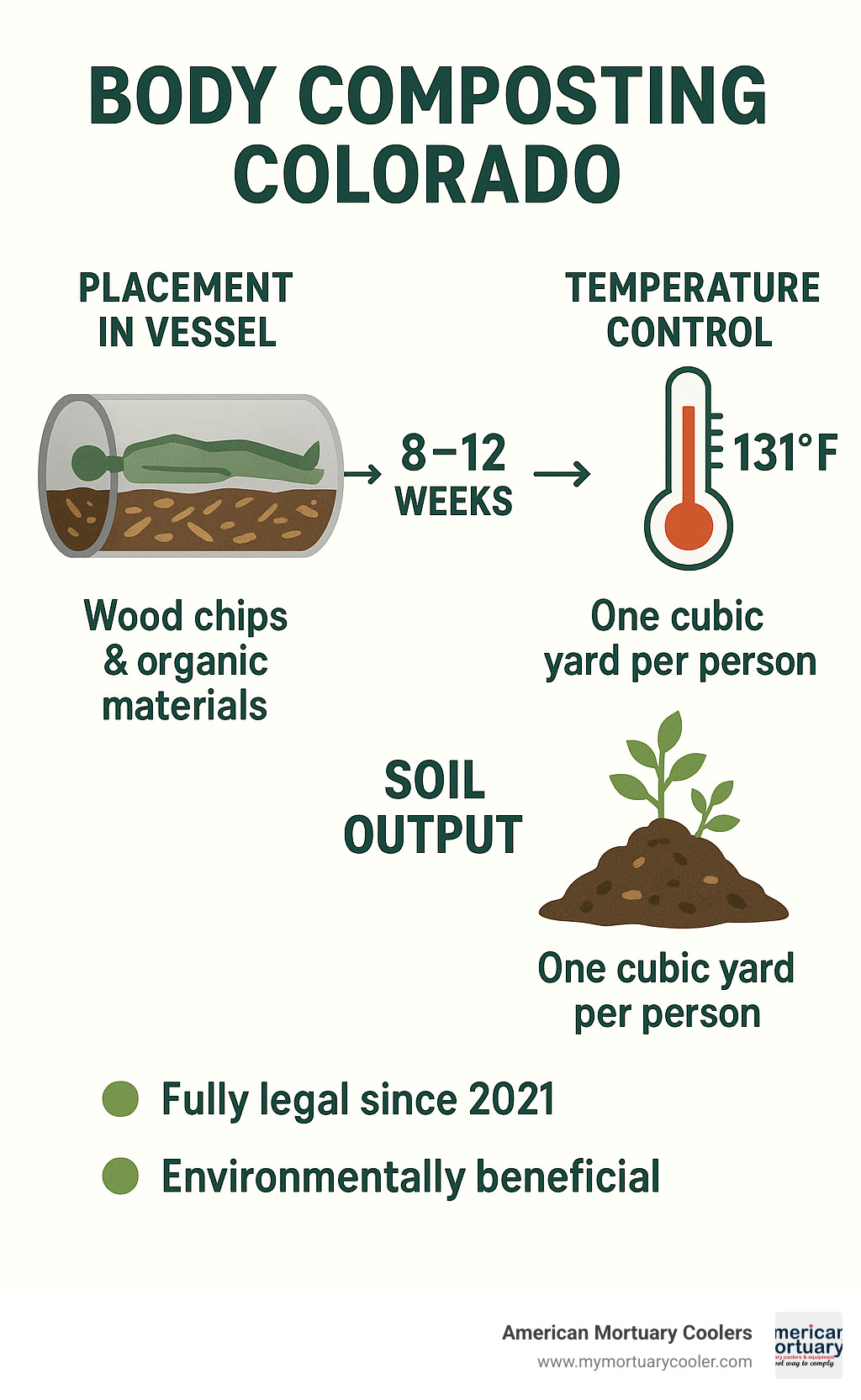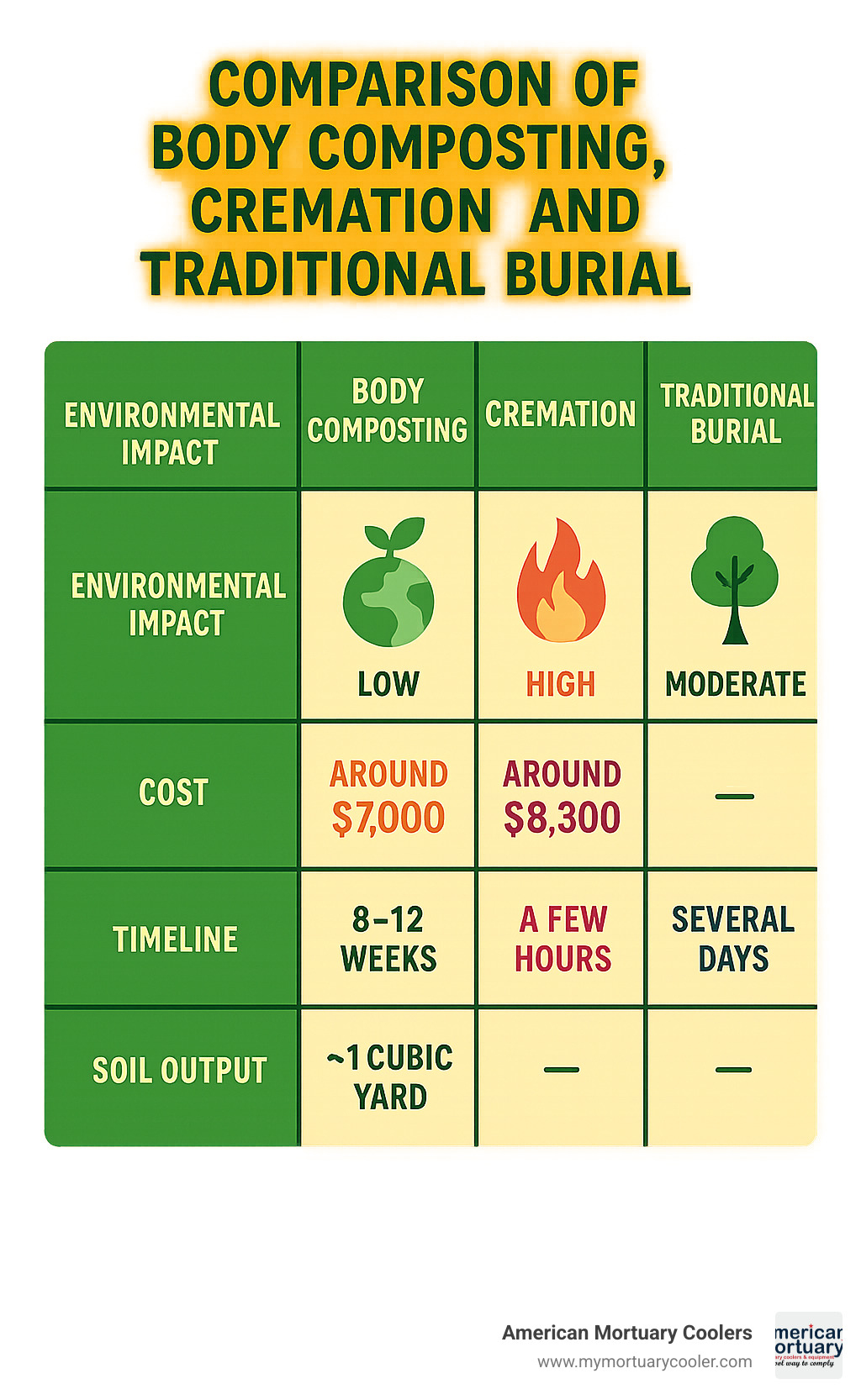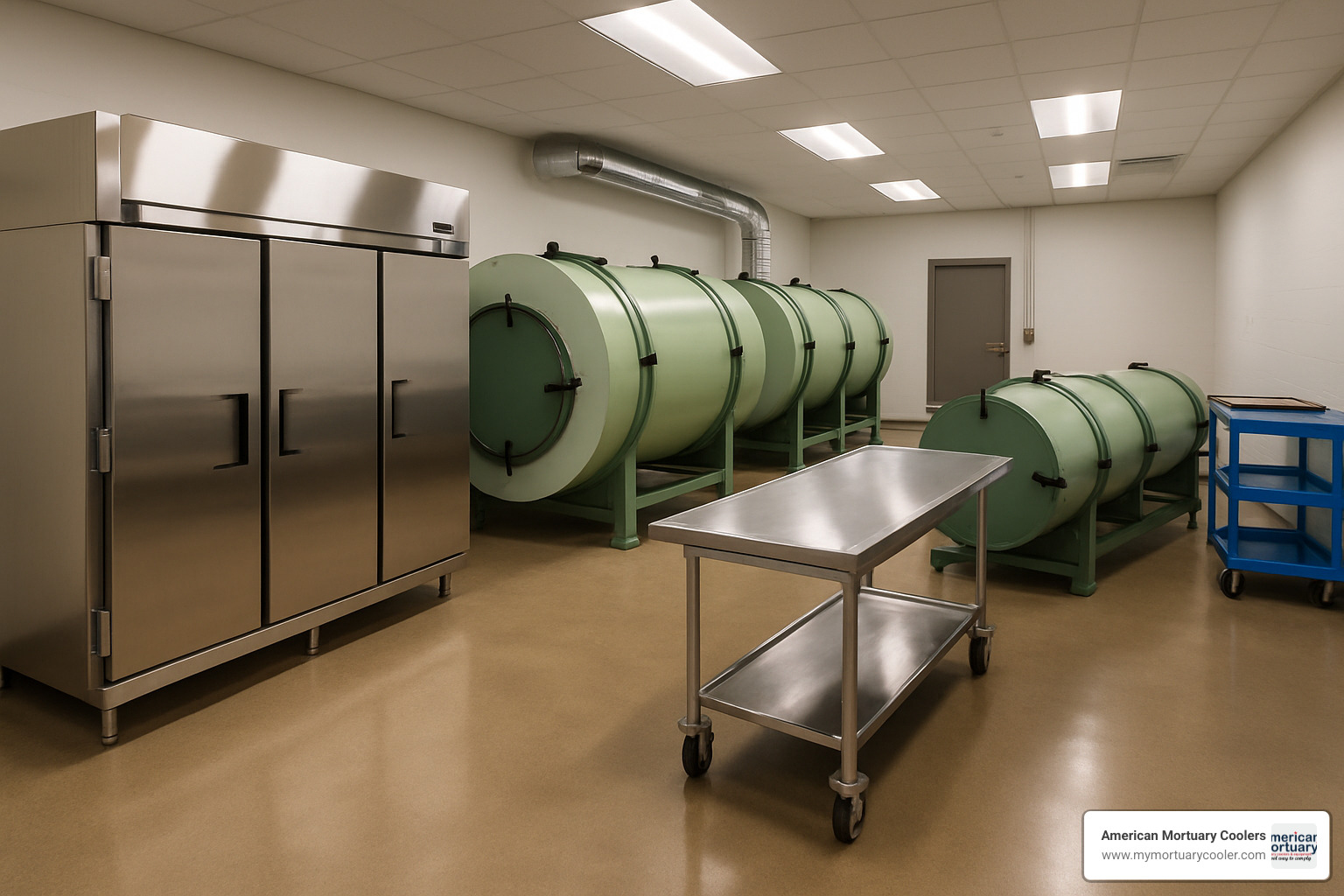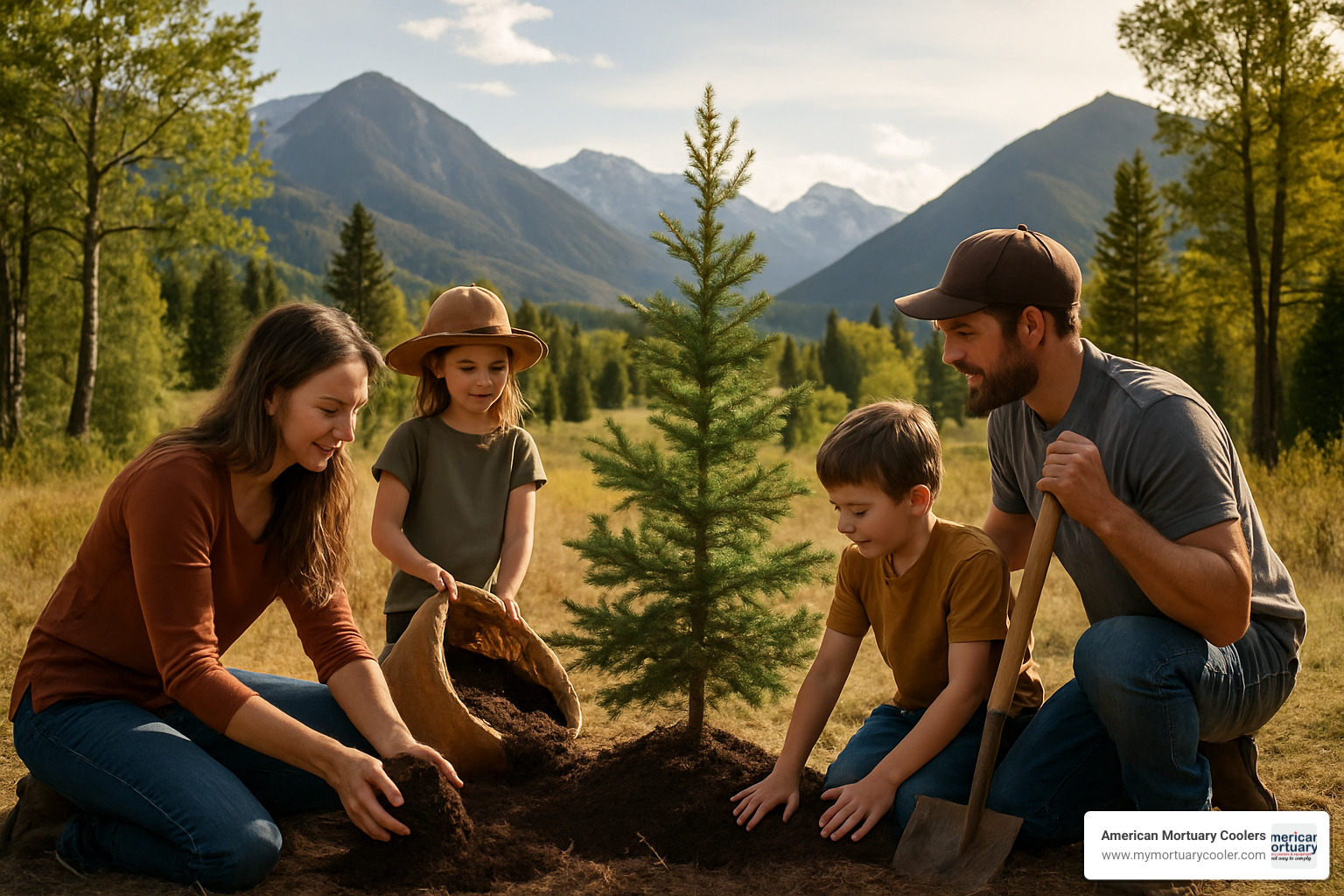Why Body Composting Colorado is Gaining Ground as a Green Death Care Option
Body composting colorado became legal on May 10, 2021, making Colorado the second state in the US to offer this eco-friendly alternative to traditional burial and cremation. Here's what Colorado residents need to know:
Quick Facts:
- Legal Status: Fully legal since 2021 under Colorado SB21-006
- Process Time: 8-12 weeks total (5-7 weeks in vessel + 3-5 weeks curing)
- Cost: Around $7,000 vs $8,300 for traditional burial
- Environmental Impact: Uses 87% less energy than cremation, saves 1 metric ton of CO₂
- Providers: The Natural Funeral (Arvada), plus out-of-state options like Recompose
This process, also called natural organic reduction or terramation, transforms human remains into nutrient-rich soil using wood chips, alfalfa, and straw in controlled conditions. The resulting soil can nourish memorial gardens or be donated to conservation projects.
As Micah Truman from a Seattle facility notes: "Our young people are going to teach us how to die better. It's been really powerful for us." In just over two years, The Natural Funeral in Colorado has composted over 100 people, showing growing acceptance of this sustainable option.
I'm Mortuary Cooler, a national-level mortuary cooler supplier with extensive experience helping funeral facilities prepare for emerging practices like body composting colorado. My background in mortuary equipment has given me deep insights into how facilities can adapt their infrastructure to support these innovative green death care options.

Body composting colorado terms you need:
How Does Body Composting Work?
Think of body composting colorado as nature's own recycling system, but with a scientific twist. The process mimics what happens naturally in forest soil, where fallen logs and leaves slowly transform into rich earth that feeds new life. The difference? This controlled version happens in specially designed stainless steel vessels over 8-12 weeks instead of years.
The magic happens through a carefully balanced recipe of wood chips for structure, alfalfa for nitrogen, and straw for carbon. These organic materials create the perfect environment for naturally occurring microbes to do their work. It's remarkably similar to the compost pile you might have in your backyard – just with much more precise controls.
Here's what makes this process so impressive: it uses 87% less energy than cremation while producing approximately one cubic yard of nutrient-rich soil per person. At The Natural Funeral in Arvada, Colorado, their facility runs 24 fully operational vessels and 15 curing bins, with each vessel processing one body per month.
The science behind pathogen control is solid too. The vessels maintain 131°F for at least 72 continuous hours, which eliminates harmful bacteria and viruses naturally through the heat generated by microbial activity.

Step-by-Step Process
The body composting colorado journey unfolds in five distinct phases that we've watched transform how families think about death care.
Deposition marks the beginning. The body is gently placed in a stainless steel vessel – picture something about the size of a small car, roughly 7 feet long, 3 feet wide, and 3 feet deep. Medical implants, prosthetics, and mercury-filled dental work are removed beforehand. Then comes the organic bedding of wood chips, alfalfa, and straw.
The active phase is where the real change happens. Naturally occurring microbes get to work, and the vessel heats up to that crucial 131°F temperature. This isn't artificial heating – it's pure biology in action. The high temperature phase lasts at least 72 hours, but the entire active phase continues for 5-7 weeks total.
Curing comes next, and patience is key here. The material moves to specialized curing bins where it rests for another 3-5 weeks. Think of this as the soil's finishing school – it's stabilizing and reaching that perfect pH balance between 6.5 and 7.0.
Screening removes the final non-organic bits. Bones and teeth, which resist the composting process due to their mineral content, are mechanically reduced to powder and mixed back into the soil. It's a respectful way to ensure the person remains complete in their final form.
Soil return completes the circle. After safety and quality testing, families receive approximately 1,000 pounds of rich, fertile soil – enough to nourish a memorial garden or donate to conservation efforts.
Materials & Timeline Specifics
The carbon-nitrogen ratio is the secret sauce that makes this whole process work. Wood chips and straw bring the carbon, creating structure and allowing air to flow through the mixture. Alfalfa delivers the nitrogen that feeds those hard-working microbes.
It's fascinating how three cubic yards of plant material shrinks down to about one cubic yard of finished soil. That's nature's efficiency at work.
Temperature control happens naturally – no external heating required. The microbes generate their own heat as they break down organic matter. The vessel must hit and hold 131°F (55°C) for at least 72 straight hours, which sounds technical but really just proves that nature knows how to keep itself safe.
The 5-7 weeks in the vessel allows complete soft tissue decomposition, while the 3-5 weeks of curing ensures the soil reaches proper pH levels and nutrient balance. Most families can expect their loved one's change to take 2-3 months from start to finish – a timeline that feels both respectful and surprisingly efficient.
Legal Landscape & Regulations in Colorado
When Colorado Governor Jared Polis signed Senate Bill 21-006 into law on May 10, 2021, he opened the door for families seeking earth-friendly alternatives to traditional burial and cremation. This groundbreaking legislation made Colorado the second state in the nation to accept body composting colorado as a legal way to care for our loved ones after death.
The journey to legalization wasn't just about passing a law—it was about recognizing that families deserve choices that align with their values. Environmental advocates worked alongside death care professionals to craft legislation that prioritizes both safety and sustainability. The bipartisan support this bill received shows how body composting colorado resonates across political lines.
What makes Colorado's approach particularly thoughtful is how the state learned from Washington's pioneering experience. Rather than reinventing the wheel, Colorado adapted proven regulations to fit local needs and conditions. The result is a framework that protects families while supporting innovation in green death care.
The timeline from law to reality moved remarkably fast. By March 2022, less than a year after legalization, Colorado celebrated its first legally composted human remains being laid to rest at the Colorado Burial Preserve in Fremont County. This milestone ceremony marked more than just a first—it represented hope for families who had been waiting for sustainable options.
Latest reporting on legalization captures the excitement and careful planning that went into making this vision reality.
Is Body Composting Colorado Law-Friendly?
The short answer is yes—Colorado's regulations create a welcoming environment for body composting colorado while maintaining important safety standards. The state requires that only licensed funeral homes or crematories can offer natural organic reduction services, ensuring families work with qualified professionals.
Facilities must maintain proper licensing through the state health board and undergo regular inspections. While a 2022 Colorado law granted inspection authority, the state hasn't yet funded a full-time inspector position—a detail that shows the practice is still growing into its regulatory framework.
What's encouraging is how quickly Colorado moved from legislation to implementation. The Natural Funeral in Arvada became operational in early 2022, demonstrating that the regulatory environment supports rather than hinders innovation. Their success composting over 100 people in just two years proves that body composting colorado isn't just legal—it's thriving.
Rules for Soil Use & Scattering
Colorado's soil use regulations strike a thoughtful balance between freedom and responsibility. The law prohibits selling the composted soil commercially, mixing different people's remains without permission, or using the soil to grow food crops for human consumption. These restrictions protect both public health and the dignity of the process.
Families have meaningful options for their loved one's soil. Many create memorial gardens where they can visit and remember, while others choose to scatter the soil in natural areas with landowner permission. Some families find deep meaning in donating their soil to conservation projects, knowing their loved one continues to nurture the earth.
The Colorado Burial Preserve exemplifies this conservation approach through their Native Prairie Restoration Program. Donated human compost helps restore native ecosystems, creating lasting environmental benefits that extend far beyond individual families. Certified Natural Burial Grounds across the state welcome these donations for similar habitat restoration work.
Local zoning laws may affect where families can scatter soil, so it's wise to check municipal regulations before making plans. Most funeral homes offering body composting colorado services can guide families through these local requirements, ensuring the final disposition honors both legal requirements and personal wishes.
Costs, Providers & Pre-Planning Options
When Colorado families consider body composting colorado, cost often becomes a key factor in their decision-making process. The good news is that human composting typically costs around $7,000, which places it right between cremation at $6,280 and traditional burial at $8,300.
However, there's an important catch to consider. If you need to transport your loved one to an out-of-state facility, those transport fees can add $3,500 to $5,000 to your total bill. This makes local Colorado providers much more economical for families in our state.
The financial picture becomes even clearer when you factor in that traditional burial often requires purchasing a cemetery plot, which can add anywhere from $1,000 to $5,000 or more to your final costs. With body composting, there are no ongoing plot fees or maintenance costs to worry about.
Many providers understand that planning for end-of-life costs can feel overwhelming. That's why they offer prepaid plans starting at just $100 per month. These plans don't require medical exams or have age restrictions, and they protect your family against inflation while ensuring services will be available when needed.
Insurance coverage for body composting varies significantly depending on your provider and policy type. Some life insurance policies may cover alternative disposition methods like natural organic reduction, but we recommend checking directly with your insurance company to understand your specific coverage.

Mortuary Coolers & Body Composting: A Necessity explains how proper refrigeration equipment supports the body composting process by maintaining optimal conditions before the composting begins.
Who Offers Body Composting Colorado Services?
Finding the right provider for body composting colorado services means understanding your options, both in-state and beyond. Each provider offers different advantages that might appeal to different families.
The Natural Funeral in Arvada stands out as Colorado's pioneering facility. They operate an impressive 24 vessels and 15 curing bins, having successfully composted over 100 people in just over two years of operation. What's particularly encouraging is that 28 of their 34 recent cases have been Colorado residents, showing strong local acceptance of their services.
For families willing to consider out-of-state options, Recompose in Seattle offers the experience of being the pioneering company that developed much of today's modern composting technology. They work with local funeral homes to handle transportation and serve Colorado residents regularly. About 15% of their total clients come from out-of-state, demonstrating the strong demand for their established services.
Earth Funeral takes a unique approach by powering their facilities with renewable energy and forming partnerships with conservation organizations. They provide services throughout the United States, including Colorado, and offer both immediate-need services and prepaid planning options.
Return Home operates what they call the world's first large-scale facility, featuring 74 custom-designed vessels. They serve families across 49 states and Canada, and they offer something special that other providers don't: the opportunity for in-person visitation during the composting process.
Many local funeral homes have developed partnerships with these providers to handle the coordination and transportation logistics, making the entire process much more accessible for Colorado families.
Budgeting & Comparing End-of-Life Choices
Understanding how body composting colorado fits into the broader landscape of end-of-life costs helps families make informed decisions. The numbers tell an interesting story about value and environmental impact.
Traditional funerals with burial average $8,300, but that's before you factor in cemetery plot costs that can range from $1,000 to $5,000 or more. When you add ongoing maintenance fees and the environmental impact, the true cost becomes much higher.
Body composting at around $7,000 eliminates the need for cemetery plots entirely, and there are no ongoing maintenance costs for families to worry about. The Natural Funeral's pricing sits at $7,900 for their complete composting process, though additional fees may apply for ceremonies or special transportation needs.
Cremation costs $6,280 on average, making it the least expensive option upfront. However, many families still choose to purchase urns and hold memorial services, which can add to the total cost.
Green burial offers the most economical option at $2,000 to $4,000, but it requires access to certified natural burial grounds, which aren't available in all areas of Colorado.
What sets body composting apart isn't just the competitive pricing—it's the environmental value. Each body composting process saves one metric ton of CO₂ compared to cremation and uses 87% less energy than traditional burial methods. For environmentally conscious families, this environmental benefit often justifies any cost difference they might encounter.
Environmental & Cultural Impact
Body composting colorado creates a ripple effect of positive environmental change that extends far beyond individual families. When someone chooses natural organic reduction, they prevent approximately one metric ton of CO₂ from entering our atmosphere - that's like taking a car off the road for over 2,000 miles of driving.
The environmental math is compelling. Traditional cremation burns fossil fuels at temperatures exceeding 1,800°F for hours, while burial requires toxic embalming chemicals, concrete vaults, and steel caskets that resist decomposition. Body composting sidesteps all of this, using no fossil fuels, no toxic chemicals, and no concrete - just the natural power of microbes doing what they've done for millions of years.
But here's where it gets really exciting: that one cubic yard of nutrient-rich soil doesn't just sit in storage. It becomes part of something bigger.
The Colorado Burial Preserve uses donated human compost in their Native Prairie Restoration Program, helping restore native grasslands that support local wildlife. Other conservation organizations throughout Colorado accept soil donations for reforestation projects, habitat restoration, and erosion control efforts.

Families often describe the cultural shift as profound. Instead of visiting a static headstone, they can plant memorial trees, create wildflower gardens, or contribute to land conservation projects that grow and change with the seasons. One Colorado family told us: "This was the easiest decision I have ever made on a topic that is the hardest to discuss with family members."
The process also invites family participation in ways traditional death care doesn't. Some facilities offer virtual tours during the composting process, allowing families to understand and connect with what's happening. Others provide ceremonies where families can add meaningful items to the composting vessel or participate in soil screening.
Public Perception & Growing Demand
The numbers tell a clear story about changing attitudes toward body composting colorado. A comprehensive survey of 1,500 Americans revealed that 21% changed their end-of-life preferences due to the pandemic, with 11% now preferring natural decomposition methods over traditional options.
Millennials and Gen Z are leading this shift, viewing body composting as perfectly aligned with their environmental values and desire for authentic, meaningful experiences. They're the generation that composts kitchen scraps, chooses sustainable products, and questions traditional institutions - so natural organic reduction feels like a natural extension of how they live.
The recent Return to Nature scandal in Colorado, where 190 bodies were allegedly stored improperly, has actually increased interest in transparent, regulated alternatives. Families are asking harder questions about funeral providers and seeking companies that offer open houses, facility tours, and detailed process explanations.
The Natural Funeral responds to this demand with monthly public tours of their Arvada facility, while companies like Recompose offer virtual facility visits that let families see exactly how the process works. This transparency builds trust and helps normalize what was once considered an unusual choice.
Provider open houses have become surprisingly popular community events. Families bring their adult children, ask detailed questions about the science, and often leave feeling relieved to have found an option that matches their values. As one facility manager noted: "People are hungry for alternatives that make sense environmentally and emotionally."
Frequently Asked Questions about Body Composting Colorado
Families considering body composting colorado often have similar concerns and questions. After working with funeral facilities across the country, I've seen these conversations happen countless times. Let me address the most common questions we hear from both families and funeral professionals.
The biggest question is always about legality. Body composting colorado became fully legal on May 10, 2021, when Governor Polis signed Senate Bill 21-006. This made Colorado the second state to accept this practice, following Washington's lead.
Cost comes up next in almost every conversation. Families can expect to pay around $7,000 for the composting process itself. The Natural Funeral in Arvada charges approximately $7,900 for their complete service. If you're considering out-of-state providers like Recompose or Earth Funeral, add another $3,500-$5,000 for transport costs.
For services, Colorado residents have good options. The Natural Funeral in Arvada handles most local cases, while national providers like Recompose, Earth Funeral, and Return Home work with Colorado funeral homes to coordinate transportation and services.
How quickly can the process be completed?
The complete body composting colorado process takes about 8-12 weeks from start to finish. This isn't something that happens overnight, and honestly, most families appreciate having this time to process their grief.
The timeline breaks into two main phases. First, your loved one spends 5-7 weeks in the composting vessel, where the active decomposition happens at a carefully controlled 131°F. Then comes the curing phase, which takes another 3-5 weeks while the soil stabilizes and reaches the proper pH levels.
Most families receive the finished soil about 2-3 months after the process begins. Some facilities offer expedited services for an additional fee, though this might affect the quality of the final product. In my experience, the standard timeline actually helps families plan meaningful memorial services without feeling rushed.
Can organ donors still choose composting?
Absolutely. Body composting colorado works perfectly with organ donation, and many families find this combination especially meaningful. The medical team removes organs at the time of death, then the body can undergo composting once it's returned from the medical facility.
The composting process handles bodies that have undergone organ donation, tissue donation, or even autopsy without any problems. The only things that need removal are certain medical implants, prosthetics, and dental work containing mercury. The facility takes care of this before composting begins.
I've worked with families who chose both organ donation and body composting because it felt like the most complete way to give back. They loved knowing their person could give life through organ donation and then return to nurture the earth through composting.
Where can families use the resulting soil?
The composted soil offers families several beautiful options for honoring their loved one. Memorial gardens are incredibly popular – families create dedicated spaces with flowers, vegetables, or trees that held special meaning. There's something powerful about watching life grow from this soil.
Many families choose to donate soil to conservation projects throughout Colorado. These donations support habitat restoration, prairie restoration, and reforestation efforts. The Colorado Burial Preserve uses donated soil in their Native Prairie Restoration Program, creating lasting environmental benefits.
With landowner permission, families can scatter soil in natural areas that were special to their loved one – favorite hiking trails, fishing spots, or camping areas. Some families keep portions for houseplants and container gardens they can tend year-round.
Colorado law does include some restrictions worth knowing about. You can't use the soil for growing food crops for human consumption or sell it commercially. The soil also can't be mixed with other people's remains without specific written permission from all families involved.
Conclusion
Body composting colorado has quietly become one of the most meaningful changes in death care since Colorado legalized it in 2021. What started as an alternative for environmentally conscious families has grown into a movement that's reshaping how we think about our final impact on the earth.
At American Mortuary Coolers, we've had a front-row seat to this change. From our base in Tennessee, we've watched funeral homes across the Rocky Mountain Region adapt their facilities to support these green death care practices. The requests for temperature-controlled storage equipment and specialized handling systems tell us this isn't just a trend – it's the future of funeral care.
The numbers speak for themselves. The Natural Funeral in Arvada has composted over 100 people in just two years, saving approximately 100 metric tons of CO₂ from entering our atmosphere. That's equivalent to taking dozens of cars off the road permanently, all while creating nutrient-rich soil that's helping restore Colorado's native prairies and forests.
What moves us most are the stories from families who've chosen this path. They talk about finding peace in knowing their loved one continues to give back to the earth. They plant memorial gardens with the composted soil, donate it to conservation projects, or scatter it in favorite outdoor spots where memories were made.
For funeral professionals reading this, the infrastructure needs are real but manageable. Proper refrigeration equipment, transport partnerships, and staff training all contribute to successful service delivery. The families choosing body composting often become your most grateful clients because you've helped them align their values with their final act of love.
The cost at around $7,000 positions body composting as an accessible middle ground between cremation and traditional burial. More importantly, it offers something neither of those options can – the creation of new life from death in the most literal sense possible.
As we look ahead, we expect body composting colorado services to expand beyond the Denver metro area into smaller communities throughout the state. The combination of environmental benefits, meaningful family participation, and reasonable costs creates a compelling option for Colorado's environmentally conscious population.
Whether you're planning ahead for yourself or supporting a family through loss, this option represents hope. It shows us that even in death, we can choose to nurture life, restore habitats, and leave the world a little better than we found it.
More info about organic reduction options provides the technical details for those interested in the science and equipment that makes this beautiful process possible.


















